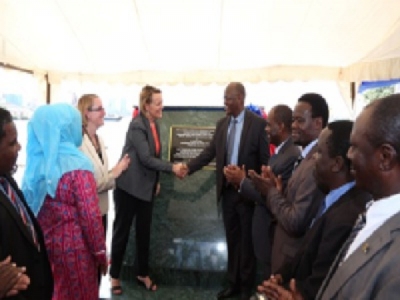
Posted on July 6, 2017
By Alvar Mwakyusa, allAfrica
Magufuli orders contractor to fasCARGO handling at the Dar es Salaam port is set to surge to 28 million tonnes from the current 18 million per year, upon completion of the mega 926.2bn/- project.
President John Magufuli yesterday laid the foundation stone, launching the construction works to deepen and upgrade the port’s berths one to seven.
Dr Magufuli was informed under the improvements, the port would have capacity to handle larger ships, Post Panamax, which can carry between 6,000 and 8,000 twenty-foot equivalent units (TEUs) from the existing maximum capacity of 4,000 TEUs by smaller ocean going vessels.
The upgrading of the country’s major port through the Dar es Salaam Maritime Gateway Project (DMGP) will enable more ships to dock, offload and load shipments at the habour at one time, reducing dwell time and enhancing efficiency.
The dwell time at the port is expected to drop from 80 to 30 hours once the expansion and deepening works are completed in 2023. Dr Magufuli was equally impressed by the mega project and instructed the contractor, China Harbour Engineering Company (CHEC), to fast-track the project from 36 to between 28 and 30 months.
“This project will benefit not only Tanzania but her landlocked neighbours like Rwanda, Zambia, Burundi, Uganda, Malawi and Democratic Republic of Congo (DRC). The envisaged Standard Gauge Railway (SGR) will highly depend on the effectiveness of the port that handles 90 per cent of imported goods,” he said.
The president was upbeat on increased trade within the East African Community (EAC) and the Southern African Development Community (SADC) which have populations of 165 million and 400 million, respectively.
The World Bank has offered a 345 million US dollar (over 700bn/-) loan for the project while the United Kingdom through the Department for International Development (DfID) dished out a 12.4 million US dollar grant.
The Tanzanian government, through own sources, will provide 63.4 million dollars. Presently, only smaller ships with 243 metre lengths and carrying capacity of between 2,500 and 4,000 TEUs can dock but after the upgrading works, the port will accommodate Post Panamax ships with 320-metre lengths to offload and load shipments.
The Director General of Tanzania Ports Authority (TPA), Eng Deusdedit Kakoko, said the venture will be undertaken in twot track construction worksphases, the first being expansion of the berths, construction of terminals and a specialized berth for imported vehicles (Ro-Ro terminal).
“The second phase will include deepening and widening of the entrance channel and turning basin in addition to improvement of rail linkages and platform in the port,” Eng Kakoko explained.
The entrance channel will have its depth deepened from 10.2 to 15.5 metres in a distance of eight kilome tres and its width widened to 170 from the current 140 metres to allow bigger ships to sail smoothly to and from the harbour, according to Eng Kakoko.
The Dar es Salaam port currently has 12 berths including the Single Point Mooring (SPM) for petroleum products in Kigamboni area. Seven of the berths are dedicated to general cargo and four to container operations.
Last year, the harbour handled 14 million tonnes, up from 13.8 million tonnes in 2015 and 13.1 million tonnes in 2014, reflecting an average growth of nine per cent per year over the last five years.
At the occasion yesterday, the World Bank Country Director for Tanzania, Malawi, Burundi and Somalia, Ms Bella Bird, said enhancing operational potential of the port will boost trade and job creation across the region.
“This will reduce the current cost of between 200 and 400 US dollars for each additional day of delay for a single consignment. The Dar es Salaam port is vital for the economies of Tanzania and neighbouring countries,” Ms Bird stated.
The British High Commissioner in Tanzania, Ms Sarah Cooke, said her government is committed to support Tanzania’s growth and help to improve the lives of its people.
The Minister for Works, Transport and Communications, Prof Makame Mbarawa, was highly positive that the improvements will attract additional domestic shipments and from landlocked neighbours, who export and import their goods through the port.
Source: allAfrica





